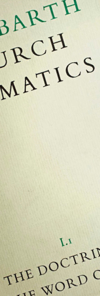 From time to time on this blog, I have indulged in slow reading – working through a text in enough detail to make my comments longer than the original, stretching the reading over a period of months. It’s the only thing I’ve really missed while I’ve been away from blogging – and it is the thing that brings me back now. I am working (gradually) towards a book on the nature of Christian doctrine, and there are some texts I want to read slowly to help get my thinking going. Offline, I spent much more time than I expected reading Lindbeck’s The Nature of Doctrine (which is thirty years old next year!), and I have a list of other authors I need to spend time with. But I have been thinking that, for one of them, it might be good to read slowly in public again.
From time to time on this blog, I have indulged in slow reading – working through a text in enough detail to make my comments longer than the original, stretching the reading over a period of months. It’s the only thing I’ve really missed while I’ve been away from blogging – and it is the thing that brings me back now. I am working (gradually) towards a book on the nature of Christian doctrine, and there are some texts I want to read slowly to help get my thinking going. Offline, I spent much more time than I expected reading Lindbeck’s The Nature of Doctrine (which is thirty years old next year!), and I have a list of other authors I need to spend time with. But I have been thinking that, for one of them, it might be good to read slowly in public again.
So, this is the start of a new ‘Slow Reading’ series. I’m going to read the very beginning of Karl Barth’s Church Dogmatics I/1: §1 The Task of Dogmatics. If all goes well, I might get further. Ideally, I’d like to reach as far as §7, The Word of God, Dogma and Dogmatics – but I suspect that is rather too much to ask for. So let’s just say I’m going to blog my way through §1 for now, and leave any other promises aside. And, since Barth’s text is itself presented as a commentary on the short paragraphs with which each section begins, you could think of the whole of what follows as an extended – ridiculously extended – commentary on the following text:
§1 The Task of Dogmatics
As a theological discipline dogmatics is the scientific self-examination of the Christian Church with respect to the content of its distinctive talk about God.
I’ll give page numbers from the old 1975 English edition, because they’re also given in the margins of the new Study Edition. For the German, I’m using the first volume (1986) of the Studienausgabe.
One last thing: I’m no Barth scholar, and have no real aspirations in that direction. I’m not reading this text with a mind sensitised by exposure to Barth’s other writings of this period, or alert to the difference between this and his earlier attempts at dogmatic prolegomena; I am not in a position to trace influences or development or contemporary debates. I’m interested, rather, in what you might call a ‘plain sense’ reading, and in seeing where it takes my own thinking. I’m hoping, though, that some of you who know Barth’s work much better than I do might pop up in the comments and help me see what I’m missing.
Click here for a list of the posts in this series so far.

Recent Comments